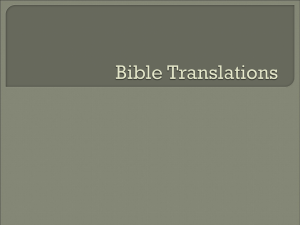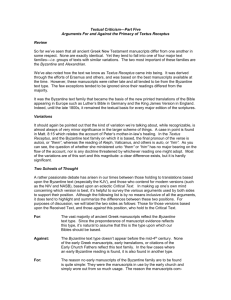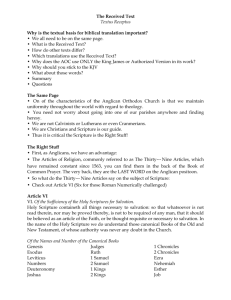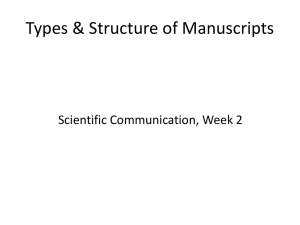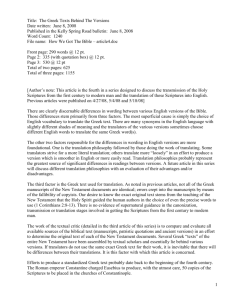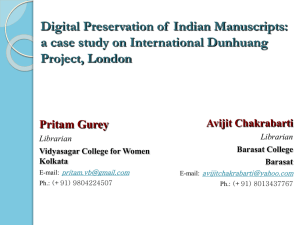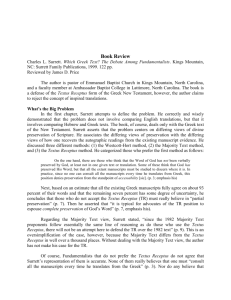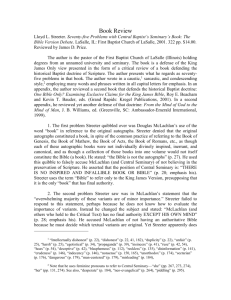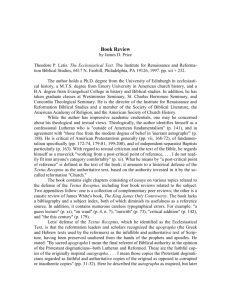Preservation Student notes
advertisement
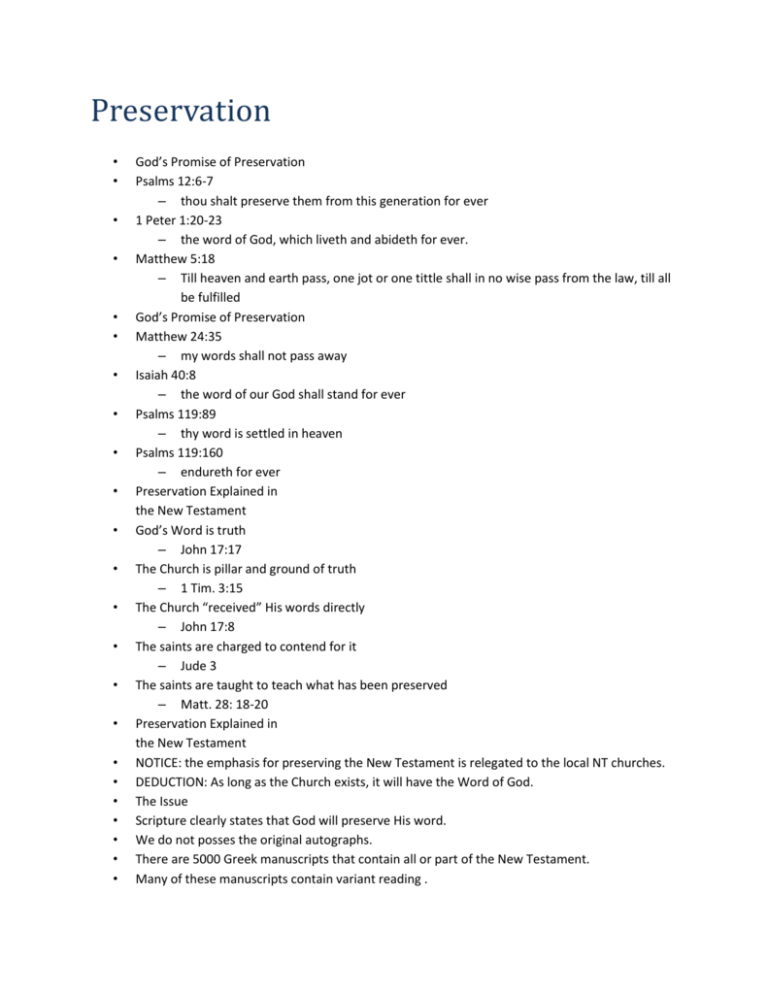
Preservation • • • • • • • • • • • • • • • • • • • • • • • God’s Promise of Preservation Psalms 12:6-7 – thou shalt preserve them from this generation for ever 1 Peter 1:20-23 – the word of God, which liveth and abideth for ever. Matthew 5:18 – Till heaven and earth pass, one jot or one tittle shall in no wise pass from the law, till all be fulfilled God’s Promise of Preservation Matthew 24:35 – my words shall not pass away Isaiah 40:8 – the word of our God shall stand for ever Psalms 119:89 – thy word is settled in heaven Psalms 119:160 – endureth for ever Preservation Explained in the New Testament God’s Word is truth – John 17:17 The Church is pillar and ground of truth – 1 Tim. 3:15 The Church “received” His words directly – John 17:8 The saints are charged to contend for it – Jude 3 The saints are taught to teach what has been preserved – Matt. 28: 18-20 Preservation Explained in the New Testament NOTICE: the emphasis for preserving the New Testament is relegated to the local NT churches. DEDUCTION: As long as the Church exists, it will have the Word of God. The Issue Scripture clearly states that God will preserve His word. We do not posses the original autographs. There are 5000 Greek manuscripts that contain all or part of the New Testament. Many of these manuscripts contain variant reading . • • • • • • • • • • • • • • • • • • • • • • • • • • • • • • • • Two Issues Textual – How do we understand God’s preservation of His Word? Was it preserved whole or in parts or fragments? Translational – Is one translation superior to the others or are all basically the same? Importance This is a serious issue which affects fundamental doctrines. Taking a different position does not make you a heretic. Both sides have difficult questions. Few have studied the issue carefully. Taking extreme positions on either side is dangerous. Synonyms Critical Text • Textus Receptus Eclectic • Received Text Minority • Byzantine Egyptian – Alexandrian • Majority Wescott & Hort • Syrian Nestles’ Aland text • Western Define these synonyms: Byzantine – refers to the region in which the gospel first spread. The Gospel left Jerusalem, traveling north by northwest. (Byzantine is taken from Byantium, which was changed to Constantinople, today called Istanbul – Turkey/Asia Minor.) Traditional – refers to the fact that this is the text that has been traditionally used by the churches. Synonyms continued Syrian – refers to the region where missions and Bible printing exploded. Antiochian – this refers to the city where the first missionaries were called. This church also printed the Old Latin (Itala) and the Syriac Peshitta. Received Text - (Textus Receptus) – refers to the fact that this text has been received by churches. Synonyms continued Alexandrian – refers to the fact that the dominant manuscripts come from Egypt. Minority – highlights the fact that his text rests on little actual manuscript evidence. Critical Text – represents a “scholarly” or critical look at the received Text; allowing for its corrections in a new text. Nestles’ – Aland text - two men most responsible for printing the Critical Text. Westcott – Hort text – two men who lead translations away from the Received Text. Two schools of belief regarding preservation God preserved his word through the Received Text (Textus Receptus, Majority) – Larger number of manuscripts but newer • God preserved his word through various manuscripts (Critical Text) and scholars must sift through to determine what is original. – Smaller number of manuscripts but older • Early Papyrus Witness • P45 – Date – A.D. 250 – 30 leaves of papyrus – All four Gospels & Acts • P46 – Date – A.D. 250 – 86 leaves – 10 epistles of Paul • Early Uncial Manuscripts • אCodex Sinaiticus – Date A.D. 500 – Entire Bible • Discovered in 1844 (in a basket of scraps that the monks were using to light their fires) • Codex Vaticanus – Date A.D. 325-350 – Entire Bible – Existed in Rome prior to 1475 • Origins of the Textus Receptus • Erasmus – Date A.D. 1516 – Edited and printed a Greek text according to the Byzantine text . • Changes in modern versions • Omitted Verses – Acts 8:37 – Matthew 17:21 – John 5:4 • Changed Text – 1 John 5:7 • Footnoted Text – John 8:1-11 – Mark 16:9-20 • Isaiah 40:8 The grass withereth, the flower fadeth: but the word of our God shall stand for ever. • Major Players • John Wycliffe – first to publish Bible in English during the late 1300’s. His English is based on the Latin Vulgate. • William Tyndale – first to translate from Greek to English, and was Burned at the stake • • • • • • • • • • • • • • • • • • • – KJV retains over 90% of his word translations Erasmus – Catholic priest. Not in good favor with the Pope (his work was on the “Forbidden Reading” list) Not wanting to break with tradition as a Protestant. (dies somewhere in between…) Used of God to bring the churches back to a pure Greek text used by underground churches rather than using the corrupted Vulgate by Jerome. Major Players continued Stephanus – Also presented the world with several GreeK editions. He also divided the Bible into chapters and verses. Elziver Brothers - printing team that published Bibles and texts. As an advertising blurb, they mentioned the “omnibum textum receptum…” the text now received by all. The name “Textus Receptus” stuck. Critical text proponents have four major factors: The oldest manuscripts are the best. The manuscripts should be weighed, not counted. The more difficult readings are to be preferred. The shorter reading is to be preferred. Facts are pesky things! Fact 1 – Alexandrian text is shorter; the Received Text is longer. Fact 2 – Alexandrian manuscripts are older than the Byzantine. How you “interpret” these facts is where the debate rages: – Were early heretics more apt to take away or add to text? – Were older manuscripts “older” because of rejection? How did God preserve his word? God preserved his word through the Received Text (Textus Receptus, Majority) – Used for many centuries with very little variation God preserved his word through various manuscripts (Critical Text) and scholars must sift through to determine what is original. – Discovered in recent years (1844, 1933) a great deal of disagreement Conclusion God has preserved his word through the Received Text . – It has been consistently used by the church – Protects key doctrines – Does not rely on the work of scholars – Contains few minor variations – The Issue of Translation Two Philosophies – Dynamic-equivalence (or functional-equivalence) • ‘free translation’ or a ‘paraphrase’ • Readability • Little or no attention to obtaining a word-for-word correspondence between the original and the translation. • • • • • • • • • • • • • • • • • • • • • • • • • A correspondence of ideas between the two languages The Issue of Translation Two Philosophies – Formal-equivalence (or formal-correspondence) • ‘literal translations’ • concerns itself primarily with accuracy or faithfulness to the original text • preserves as much of the source-language grammatical structures and word usages Superiority of KJV Demonstrates the doctrine of preservation, being faithfully used for 400 years. Based on the Textus Receptus. Protects key doctrines 50 Well educated men translated the KJV. KJV Translators Lancelot Andrewes – Master of fifteen languages – Learned new languages while on vacation Francis Billingham – Used the Greek language in debates Henry Seville – Greek tutor for Queen Elizabeth Superiority of KJV The English of KJV is more accurate than English of today. – Thou 2nd person Singular, Ye 2nd person plural It was translated using Formal Equivalency. Isaiah 40:8 The grass withereth, the flower fadeth: but the word of our God shall stand for ever. Verses for Preservation Luke 16:29; John 5:39; 2 Timothy 3:15-16; 2 Timothy 4:1; Psalm 100: 5; Psalm 111; 7-8; Psalm 117: 2; Acts 7:38; Psalm 119: 22, 57, 100, 144, 152, 160; Matthew 4:4; Matthew 24:35; John 10: 35; 1 Peter 1:25; (Isaiah 40:8) Conclusion The purpose of preservation is PROPAGATION. We do not have these doctrines to argue over translations, texts, or pet doctrines. God has given us His Word so that we will LIVE it and SPREAD it. Verses on Illumination Luke 24:44-45 – opened he their understanding 1 Corinthians 2:9-14 – we might know the things that are freely given to us of God John 14:26 – he shall teach you all things John 16:12-15 • • – he will guide you into all truth Illumination Illumination is the work of the Holy Spirit in helping man to understand and apply the truths of God’s word to his own personal walk. – Psalms 119:18 Open thou mine eyes, that I may behold wondrous things out of thy law.
